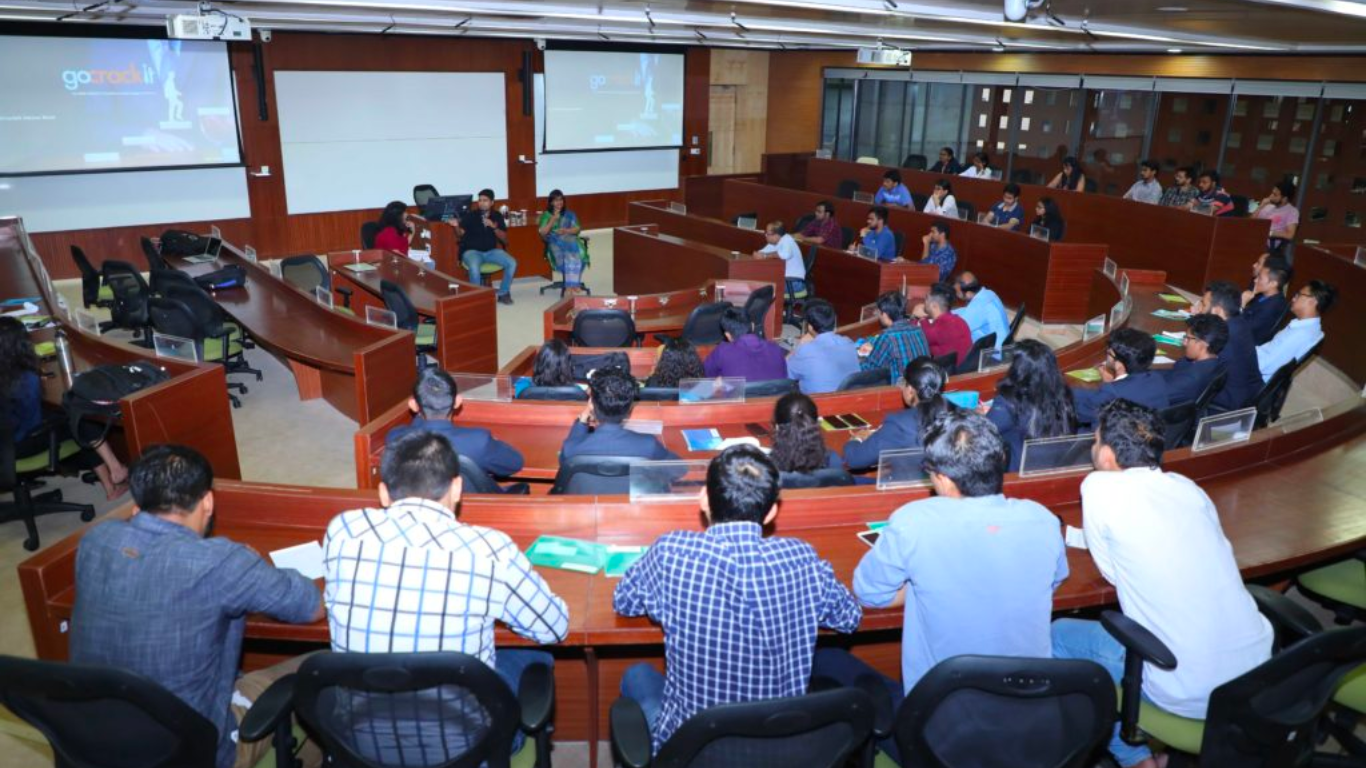We organized a dynamic GoCrackIt Intern Meet Up at the prestigious IIM Bangalore on the 27th of April . The focal point of this event was the intriguing theme, “E-commerce: Trends & Opportunities,” which drew significant attention and participation. Our event was graced by two distinguished experts in the field: Pallavi Palkar, the National Head (T-2 cities) at Bigbasket, and Tridev Kundu, an accomplished professional in Supply Chain Design at Flipkart. Their presence added a wealth of knowledge and experience to our discussions.
Throughout the event, we delved deep into various facets of the E-commerce industry and explored the vast landscape of career opportunities it offers. The interactions with the students were nothing short of captivating, sparking insightful dialogues and thought-provoking exchanges.
From these engaging discussions, we gleaned valuable insights that shed light on the current state of E-commerce and the promising avenues it presents for aspiring professionals.
Here are some key takeaways from our discussions:
- Why E-commerce as a career
- New challenges
- E-commerce industry is a very nascent stage which gives tremendous opportunity to come up with innovative ideas and at the same time implementing them
- Enjoyed problem-solving in real time which is never discussed in theoretical books
- A shift from traditional industry to totally new environment
- Identified how traditional methods can be used in E-commerce industry
- New challenges
- How customers are evolving in E-commerce industry
- New concept of “Middle India”
- An interesting concept of Middle India was introduced by our mentors which can be roughly referred to consumers with disposal income and technological savviness
- New concept of “Middle India”
- Impact of Emerging/Emerged technology on E-commerce. How skill gaps can be bridged
- Required for scale
- Technology is definitely required for scaling and improving the customer experience to name a few
- Our mentors talk about examples such as preferred delivery slots for busy customers, routing algorithms for supply chain, Automated Guided Vehicle at warehouses
- Technology v/s excess manpower availability
- India is still a labour-intensive country even today, so we need to see the cost benefit of technology v/s cheap manual labor
- Technology will be more feasible over cheap labour once the technology eco system develops
- Required for scale
- Difference in marketing approach in T1 and T2 cities
- Difference in value proposition
- The value of E-commerce is different between T1 & T2 cities, while customers from T1 cities are value convenience and the customers from T2 cities are more price sensitive
- The channels to reach out are TV and Newspapers for T2 cities
- Ease of operations in T2 cities
- In T2 cities, there are no traffic problems and hiring is easier because a lot of talent is available
- Challenges of operations in T2 cities
- Issue in local pin code intelligence
- Varying region languages
- Difference in value proposition
- Trends in payments
- Understanding buyer behaviour
- Cash on Delivery (CoD) is still preferable
- Financial companies are understanding customers’ credit behaviour and bringing more schemes
- One example is Buy Now Pay Later, so that E-commerce firm can sell even when customers do not have funds during the lean period of the month
- Understanding buyer behaviour
- How to retain customer loyalty
- Efforts for multiple customer engagements
- Flipkart’s move towards grocery will help it engage more with customers as groceries are bought frequently
- Strict quality control to ensure less customer return and customer delight
- Efforts for multiple customer engagements
- Efforts for reducing losses
- Introduction of profitable product segments
- Private levels can be a profitable segment
- Being more cost effective in operations
- Reducing supply chain cost and other areas can help
- Introduction of profitable product segments
- Competencies required for getting into E-commerce firms
- Problem solving skills
- This is one of the most important skill. The ability to break down a given problem into sub problems and solve it accordingly
- Ability to think on your feet
- Think like a CEO for your own career
- Define what companies/type of companies you want to join and thoroughly know the recent initiatives/progress/achievements of companies
- Approach hiring managers with the problem which you can solve for that company
- Think beyond marquee E-commerce companies and explore other smaller/niche companies to get a foot hold in the industry
- Problem solving skills
In essence, our Meet Up provided a platform for insightful discussions and knowledge-sharing that will undoubtedly benefit aspiring professionals looking to make their mark in the dynamic world of E-commerce.




Leave a Reply